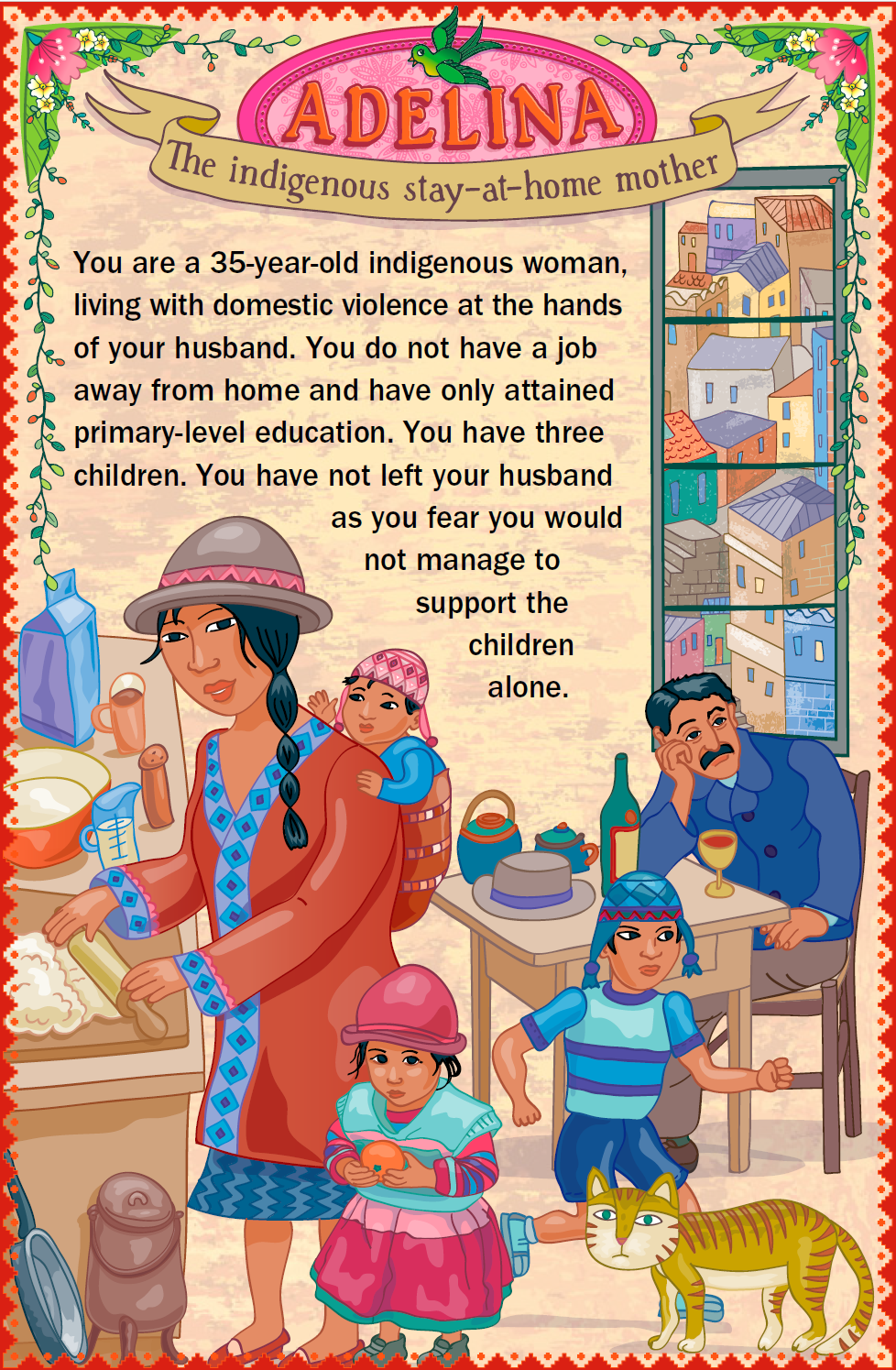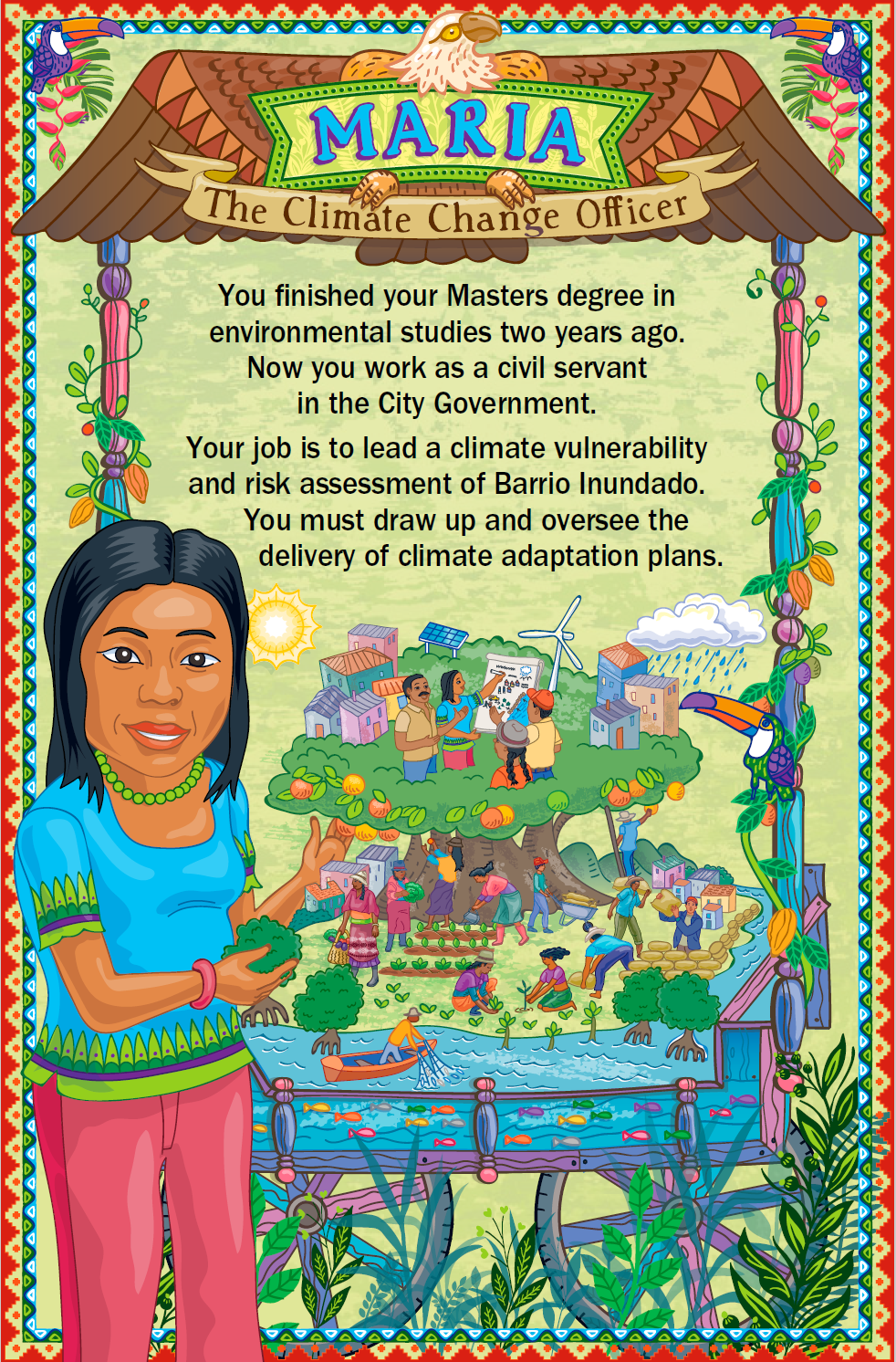Latest version of CDKN's interactive training game explores climate risk in Latin America
Latest version of CDKN's interactive training game explores climate risk in Latin America
 How would you feel if you faced climate hazards - in someone else’s shoes? How would your age, your physical and mental abilities, your health, the way other people treat you affect how you could respond? What if different members of the community got together to tackle climate-related problems? What would your role be? How could you make the most of your potential?
How would you feel if you faced climate hazards - in someone else’s shoes? How would your age, your physical and mental abilities, your health, the way other people treat you affect how you could respond? What if different members of the community got together to tackle climate-related problems? What would your role be? How could you make the most of your potential?
This new edition of the 'Climate and Society Game' brings the interactive role-play to Latin America.
It uses a colourful cast of characters set in a fictional town of Ecuador or elsewhere in the Andean region (e.g. Colombia, Peru) to explore exactly these questions about climate risks and solutions.
The scene
The small town of Barrio Inundado suffers from floods, which have impacts on crops, markets, and housing. The floods affect people's health, safety, wellbeing, income and livelihoods.
The government is warning of increasing stresses due to climate change in the future. How can people’s lives be more secure and resilient?
That’s where you come in. Put yourself in character to have a conversation about what makes you vulnerable to the climate and what makes you able to contribute to solutions.
Objectives
For workshop or training participants to….
• Explore how people’s different gender, social, economic and cultural roles interact with and contribute to climate vulnerability and risk.
• Reflect on how these attributes affect people’s ability to respond to climate change.
• Learn, through supported discussion, about helpful tools and tactics to empower diverse people’s participation in climate adaptation and resilience planning and implementation. Begin to explore how to foster more equitable benefits from climate action.
Instructions
There are many ways to use the character cards.
Short discussion - some options
You can use the character cards simply for small-group discussion, for 10 to 30 minutes in a workshop setting. Form a pair or small group, grab a character card, discuss the climate impacts on your character, their barriers and opportunities for climate action, and solutions spaces. Draw on your own experience and imagination to visualise ways to reduce climate risks for your character.
This works best for a very mixed, international group of participants, including online.
Visit the CDKN gender training pack at www.cdkn.org/gendertraining, especially modules two and three, to see ideas on how the game cards can be used this way, in a training context.
If you have more time, and a group of participants working on climate risk management in local or national context, consider a longer version of the game-play, as described below.
Long game - Round one
Download the scenario card to immerse yourself in the world of Barrio Inundado and the floods it's facing. Read the title card for more information about the authors and organisations behind the work.
 Each Participant takes a character card and reflects on the character and their role in the scenario, paying particular attention to the instructions for ‘Round one’ on their card. (10 min) In the first round of the role play: the Facilitator (who holds the card of 'Maria the Climate Officer' ) explains that she is now consulting on how climate hazards are affecting people in the community and asking what is helping or hindering their participation in the planning process. She asks these questions to each Participant one by one: Why didn’t you come to the neighbourhood meeting …? How have the floods affected you and what would improve your situation? Ideally there is time for each character to provide an answer (up to 10 min. per person - this round may last from 45 minutes up to one hour).
Each Participant takes a character card and reflects on the character and their role in the scenario, paying particular attention to the instructions for ‘Round one’ on their card. (10 min) In the first round of the role play: the Facilitator (who holds the card of 'Maria the Climate Officer' ) explains that she is now consulting on how climate hazards are affecting people in the community and asking what is helping or hindering their participation in the planning process. She asks these questions to each Participant one by one: Why didn’t you come to the neighbourhood meeting …? How have the floods affected you and what would improve your situation? Ideally there is time for each character to provide an answer (up to 10 min. per person - this round may last from 45 minutes up to one hour).
Long game - Round two
In this ‘Round two: adaptation and resilience plans’ , the Facilitator (Maria the Climate Officer) is presenting a range of proposals that she has drafted for the community’s adaptation and resilience plan – based on the earlier consultation.
In this scenario, each Participant, in character, is responding to the adaptation and resilience proposals, using the prompts provided under 'Round two' on their character card - and also elaborating their own ideas and responding to others. In this group reflection, the Facilitator (Maria the Climate Officer) invites a discussion (10-30 minutes group discussion).
First, for the Participants: what emotions do they feel? What frustrations, hopes, opportunities – why? Were the barriers to their participation (in the planning and implementation) something that they felt could be adequately addressed in a climate resilient development programme – if so, how? What other actions and changes would be required to enable them to participate and benefit more fully? (up to 5 minutes per character).
Second, for the Facilitator (Maria the Climate Officer character), how do the perspectives of the different characters change your mind? (up to 5 minutes).
At the end of the role-play, everyone step out of character and be yourselves. In a full group discussion, answer questions like: What did you learn, from 'walking in other people's shoes'? Did you gain an insight into people's exposure and vulnerability to climate hazards, and their capacities for responding effectively? Did you deepen your understanding of how people are differently affected? Would this experience make you do anything differently in your work? (up to 30 minutes discussion).
Maria, the Climate Change Officer - download her card here
Lucia, the hard-working mother (African descent) - download her card here
Miguel, the public service professional - download his card here
Adelina, the indigenous, stay-at-home mum - download her card here
Sofia, the rural migrant of the third age - download her card here
Juan Carlos, the teenage student - download his card here
Roberto, the man living with HIV - download his card here
Please note that the game cards above were first developed for the Andean countries (Ecuador, Peru, Bolivia, Colombia). We have also introduced game cards with artwork and slightly different characters who are more suited to Chile and Argentina, below:
Paula, the hard working mother (European descent) - download her card here
Ana, the indigenous, stay-at-home mum - download her card here
Monica, the Climate Change Officer (European descent) - download her card here
Concept by: Patricia Velasco, Alexandra Vazquez and Camelia Sofeia, FFLA; Mairi Dupar, ODI. This game written by: Patricia Velasco and Mairi Dupar with Maria Jose Pacha and Gabriela Villamarin. Artwork: Adam Carnegie.
More editions
If you enjoyed this edition of the training game, you may also like:
- Ethiopia version - the fictional town affected by drought; and
- India/South Asia - the fictional low-income neighbourhood affected by sea level rise and coastal flooding.

